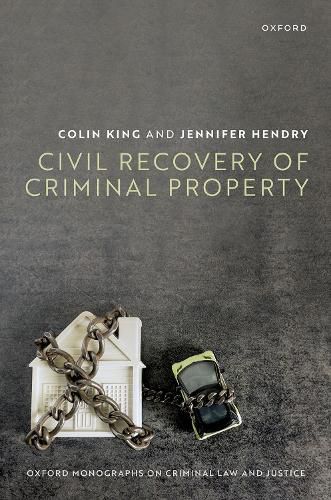Readings Newsletter
Become a Readings Member to make your shopping experience even easier.
Sign in or sign up for free!
You’re not far away from qualifying for FREE standard shipping within Australia
You’ve qualified for FREE standard shipping within Australia
The cart is loading…






Follow-the-money' approaches are increasingly being adopted to tackle organized crime, corruption, and terrorist activities. The rationale behind such an approach is oft stated: to show that crime does not pay, to reinforce confidence in a fair and effective criminal justice system, and to deter criminal activity. Civil Recovery of Criminal Property is an in-depth analysis of the confiscation of the proceeds of crime in the absence of criminal conviction in Ireland and England & Wales, more than two decades since the introduction of this civil/criminal hybrid procedure. This book considers the development of civil recovery in both jurisdictions, providing a comprehensive comparative account and critical examination of its legislative context and framework, judicial reception, and case law development. It leads the argument that civil recoveryDLlike other civil/criminal hybridsDLstraddles civil and criminal procedure in a manner that takes advantage of the resultant legal ambiguity, to the detriment of due process, civil liberties, and human rights. Through interviews with practitioners professionally engaged with civil recovery proceedings, both in defence and in enforcement, King and Hendry remedy what has until now been a lack of empirical engagement with the operation of civil recovery in practice. The authors provide a comprehensive analysis of civil recovery in terms of its procedural hybridity, its 'follow-the-money' approach, its questionable compliance with the requirements of due process, its property-specific character, and its supposed pragmatism in tackling the problem of serious and organized crime. Blending doctrinal, socio-legal, and theoretical perspectives, Civil Recovery of Criminal Property will appeal both to academics and practitioners engaged with civil recovery.
$9.00 standard shipping within Australia
FREE standard shipping within Australia for orders over $100.00
Express & International shipping calculated at checkout
Follow-the-money' approaches are increasingly being adopted to tackle organized crime, corruption, and terrorist activities. The rationale behind such an approach is oft stated: to show that crime does not pay, to reinforce confidence in a fair and effective criminal justice system, and to deter criminal activity. Civil Recovery of Criminal Property is an in-depth analysis of the confiscation of the proceeds of crime in the absence of criminal conviction in Ireland and England & Wales, more than two decades since the introduction of this civil/criminal hybrid procedure. This book considers the development of civil recovery in both jurisdictions, providing a comprehensive comparative account and critical examination of its legislative context and framework, judicial reception, and case law development. It leads the argument that civil recoveryDLlike other civil/criminal hybridsDLstraddles civil and criminal procedure in a manner that takes advantage of the resultant legal ambiguity, to the detriment of due process, civil liberties, and human rights. Through interviews with practitioners professionally engaged with civil recovery proceedings, both in defence and in enforcement, King and Hendry remedy what has until now been a lack of empirical engagement with the operation of civil recovery in practice. The authors provide a comprehensive analysis of civil recovery in terms of its procedural hybridity, its 'follow-the-money' approach, its questionable compliance with the requirements of due process, its property-specific character, and its supposed pragmatism in tackling the problem of serious and organized crime. Blending doctrinal, socio-legal, and theoretical perspectives, Civil Recovery of Criminal Property will appeal both to academics and practitioners engaged with civil recovery.